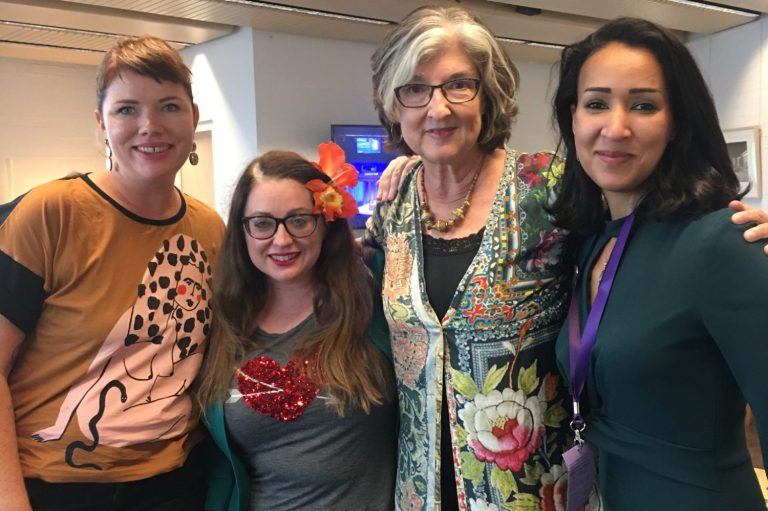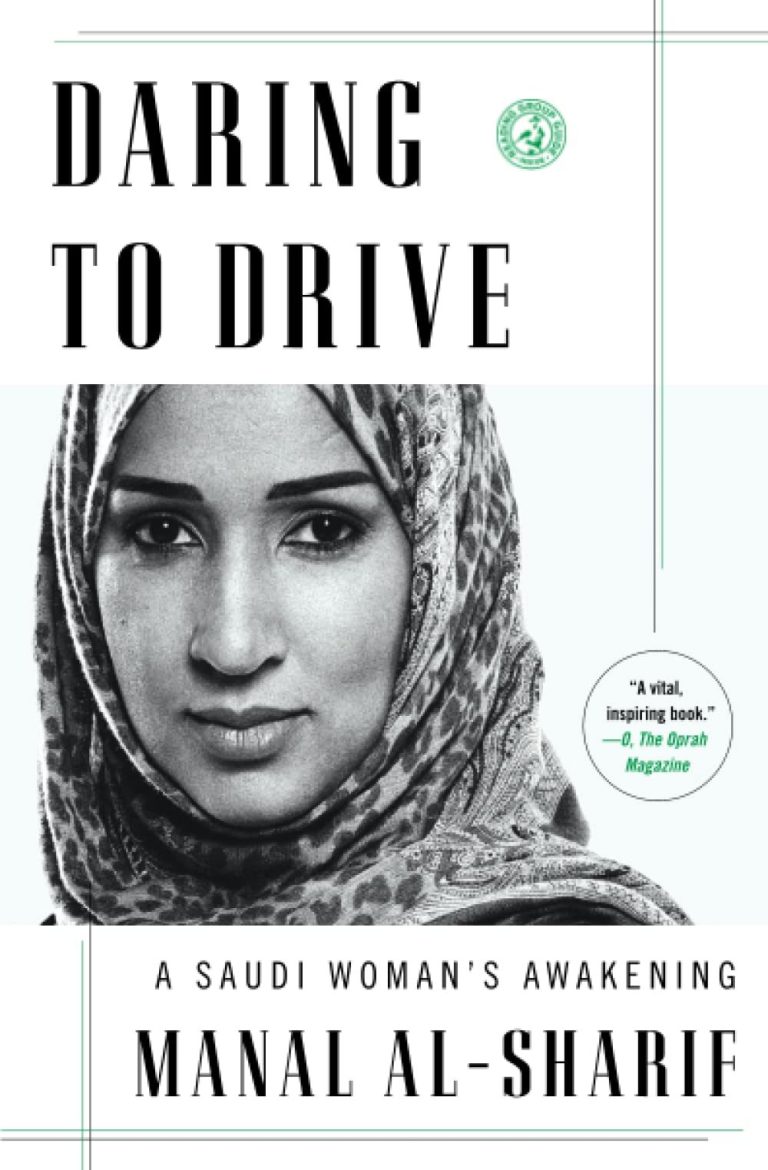
MANAL AL-SHARIF
I believe that children cannot be free if their mothers are not free, parents cannot be free if their daughters are not free, husbands cannot be free if their wives cannot be free, society is nothing if women are nothing.

Manal al-Sharif
Public Speaker | Women's Rights Activist
In May 2011, Manal posted a YouTube video of herself driving a car in the city of al-Khober in Saudi Arabia. Not long after, the secret police arrested Manal at two o’clock in the morning from her home and imprisoned her for the crime of “driving while female.” After an international outcry, the king of Saudi Arabia issued her a pardon on the condition of remaining silent. Despite the conditioned release, Manal continued campaigning against the ban on women driving and male guardianship in her country. The ban was lifted three months after publishing her memoir “Daring to Drive,” making Saudi Arabia the last country where women won this right.
Watch Manal's TED Talk
There's no actual law against women driving in Saudi Arabia. But it's forbidden. In 2011, Manal al-Sharif decided to encourage women to drive by doing so -- and filming herself for YouTube. Hear her story of what happened next.
Speaking Topics

Women's Rights
Passionate advocate for women's rights, inspiring audiences with stories of empowerment and resilience. Promoting gender equality and social change through engaging and impactful presentations.

Women in Tech
Dedicated speaker on women in tech, empowering diversity and leadership. Sharing insights, challenges, and triumphs. Inspiring future female technologists and driving innovation in the tech industry.

Diversity Equity & Inclusion (DEI)
Passionate advocate for Diversity, Equity, and Inclusion. Experienced speaker promoting diverse workplaces, equity, and inclusive cultures. Inspiring change, fostering understanding, and driving progress for a more inclusive world.
International Awards/Lists
- The Most Inspiring Arab Woman – Arabian Business, 2014
- The 100 Most Powerful Arab Women – Arabian Business, 2012, 2013 ,2014 & 2017
- 21 Leaders for the 21st Century – Women’s News, 2013
- Václav Havel Prize for Creative Dissent – Human Rights Foundation 2012
- The 100 Most Influential People in the World – TIME Magazine 2012
- Top 150 Fearless Women of the World – NewsWeek 2012
- Global Leadership Awards – Vital Voices 2012
- 100 Global Thinkers Who Shaped the World Conversation – Foreign Policy 2012
- Top 10 Digital Revolutionaries of the World – Newsweek 2012
- 10 Women Who Rocked the World – Forbes 2011
- 100 Young Leaders – Saudi Aramco 2011


DARING TO DRIVE: A SAUDI WOMAN'S AWAKENING
A ferociously intimate memoir by a devout woman from a modest family in Saudi Arabia who became the unexpected leader of a courageous movement to support women’s right to drive.
Manal al-Sharif grew up in Mecca the second daughter of a taxi driver, born the year fundamentalism took hold. In her adolescence, she was a religious radical, melting her brother’s boy band cassettes in the oven because music was haram: forbidden by Islamic law. But what a difference an education can make. By her twenties she was a computer security engineer, one of few women working in a desert compound that resembled suburban America. That’s when the Saudi kingdom’s contradictions became too much to bear: she was labeled a slut for chatting with male colleagues, her teenage brother chaperoned her on a business trip, and while she kept a car in her garage, she was forbidden from driving down city streets behind the wheel.
Daring to Drive is the fiercely intimate memoir of an accidental activist, a powerfully vivid story of a young Muslim woman who stood up to a kingdom of men—and won. Writing on the cusp of history, Manal offers a rare glimpse into the lives of women in Saudi Arabia today. Her memoir is a remarkable celebration of resilience in the face of tyranny, the extraordinary power of education and female solidarity, and the difficulties, absurdities, and joys of making your voice heard.

Manal al-Sharif, Public Speaker, Women's Rights Activist
Manal al-Sharif, a renowned Women's Rights Activist and Human Rights Defender, hails from Saudi Arabia but now proudly calls Sydney, Australia her home. Her remarkable journey has earned her international recognition and numerous accolades, making her a leading advocate for women's rights and gender equality.
Recognized by TIME as one of the 100 most influential people in the world and listed among the top 10 tech-revolutionaries by Newsweek, Manal's influence reaches far and wide. With an extensive career in Information Security that began in 2002 with ARAMCO, the world's largest oil company, she became the first Saudi woman to specialize in this field.
In 2011, Manal co-founded the groundbreaking #Women2Drive campaign, aimed at challenging the ban on women driving in Saudi Arabia. Her courageous act of getting behind the wheel resulted in her arrest on charges of "Driving While Female," disturbing public order, and inciting women to drive. She was subsequently imprisoned for her activism.
Despite facing these challenges, she continued her tireless advocacy for #Women2Drive and #IAmMyOwnGuardian, which sought to end the oppressive male guardianship system in her country. It's worth noting that Manal was released with a royal pardon on the conditions that she remained silent and ceased campaigning. However, she chose to defy these restrictions and continued to campaign against the discriminatory laws in Saudi Arabia.
Manal's impact extends to the creation of initiatives like #Faraj, designed to assist domestic helpers in leaving jail, and #IAmLama, which played a pivotal role in codifying the first anti-domestic violence law in Saudi Arabia. For her fearless activism, she was honored with the inaugural Vaclav Havel Award for Creative Dissent.
A highly sought-after public speaker, Manal has graced prestigious platforms worldwide, including TED, the United Nations, UNESCO, Harvard, and many more. Her speech at the Oslo Freedom Forum was recognized as one of the most notable speeches in history.
Manal is also a prolific writer, contributing to esteemed publications such as NewsWeek, The New York Times, The Washington Post, Australian Financial Review, Time, and Alhayat in London. Her Amazon bestseller, "Daring to Drive: A Saudi Woman's Awakening," received the GoodReads Readers Choice Award and was listed as the number one book for summer reading by Oprah Magazine.
Beyond her work in women's rights, Manal is a computer scientist and a cybersecurity specialist. She's recognized for her dedication to privacy and digital rights, establishing her authority in advocating for ethics in technology or "EthiTech." Her commitment to ethical practices in technology led to the creation of the Ethical Technologists Society, an initiative that promotes ethical tech practices protecting human rights.
Today, Manal al-Sharif resides in Sydney, Australia, where she continues her advocacy for women's rights and gender equality. Her story serves as a testament to the power of one person's unwavering dedication to making positive change in the world. Manal's impact has extended far beyond the borders of Saudi Arabia, and she remains a global icon for the promotion of gender equality, human rights, and the ethical use of technology.
CONTACT US
Send us a message if you wish to book Manal for your next event and our team will get back to you within one business day.

"The rain begins with a single drop" Manal al-Sharif
© Copyright. All rights reserved.





